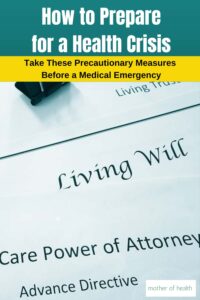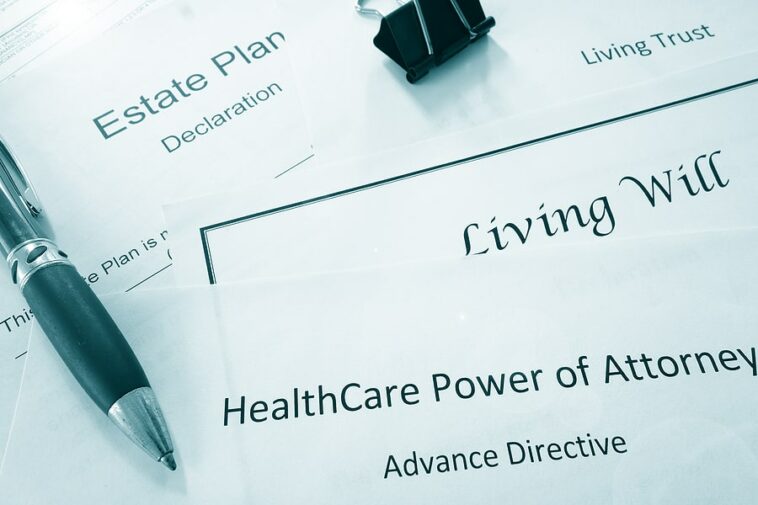Most of us don't spend a lot of time thinking about a health crisis. Accidents, diseases, or illnesses aren't on our mind until the unthinkable happens. But, in this uncertain world, it's important to be ready for health-related crises. Taking proactive steps now can help you stay prepared and reduce stress if the unexpected happens. Here's how to prepare for a health crisis and some smart strategies to make sure your wellbeing is safeguarded in case of a medical emergency.
How to Prepare for a Health Crisis
The Importance of Advanced Directives
An advanced directive is important. If you become unable to communicate your wishes for medical care, choices will be made on your behalf that you may not want.
The advanced directive document lays out specifics regarding your healthcare in the even you are unable to communicate or make your own medical decisions.
Advanced directives may also be known as:
- A living will
- Personal directive
- Medical directive
- Advanced decision
Advanced Directives are Living Documents
An advanced directive changes over time. A directive is based on medical status, values, beliefs, and wishes. The document often changes over time depending on your needs and medical status.
A healthy person may have a relatively simple advanced directive covering typical life-saving procedures where as someone with a specific illness may have a detailed advanced directive that covers unique aspects of their medical care under certain circumstances.
An advanced directive is not set in stone, but the most recent version is the document that will be upheld.
Different Types of Advanced Directives
There are different types of advanced directives and many of them work together to cover all the bases of health care. Some formats are based on state laws using specific forms. Others may be crafted by attorney's or personally without legal help.
Living Wills
These are legal documents that cover medical decisions you want made in the even you cannot communicate for yourself in real time.
Living wills are generally used at the end of life of a terminally ill person. They are made before you become incapacitated and cover medical treatments that you want or do not want under specific situations. A living will covers what conditions you want prolonged or stopped and what treatments you agree to under what circumstances.
Durable Power of Attorney for Healthcare
This document is a legal document that allows whomever you designate to make medical decisions for you if you are unable.
It is important that you speak with the person you intend to name so they are clearly aware of their responsibilities and your wishes.
Physician Orders for Life-Sustaining Treatment
The POLST form is specifically for addressing your wishes during an emergency. First responders like EMT's aren't authorized to use advanced directives and are required to provide life-sustaining treatment in an emergency.
The POLST form allows emergency medical personal to withhold life-saving or sustaining treatment and provide comfort care instead. This is especially beneficial for terminal illnesses or hospice care.
Do Not Resuscitate Orders
DNR orders are used to prevent medical staff from administering CPR, using breathing machines, reviving you, or restarting your heart if it fails.
You can request a DNR in your medical records in a hospital without an attorney. You may need to request a new DNR each time you are admitted to the hospital.
Organ and Tissue Donation
Donation may be part of an advanced directive and many states allow a designation on an ID or drivers licenses to indicate you are a donor.
Make Your Wishes Known
Advanced directives should not be a surprise to those closest to you. It's important to be sure your loved ones know your wishes prior to needing ad advanced directive.
Critical or terminal illnesses cause a lot of emotional stress and it's helpful if everyone is on the same page. Give copies of your directives to the appropriate people in your life so they are prepared and on board with your medical decisions.
What Happens If You Don't Have a Will Before You Pass On
When you die, you leave behind assets that need to be distributed and, in some cases, minor children who need guardians. Your will is a legal document that allows for your wishes to be known and carried out. Without a will, things will get very messy.
Without a will, the distribution of your assets and the guardianship of minor children will be determined by the court in the state you live in.
This can result in decisions made in ways you may not have wanted and most importantly takes a lot of time. It can also put your assets in jeopardy and needlessly disrupt your children's (and sometimes pets) lives.
Without a Will, You Give Up Authority Over Your Estate
You've spent a lifetime creating an estate, which is all the money and property you own at the time of death. You likely have very specific ideas of how you want these assets distributed.
Without a will, your wishes may not factor into the decision. Even if you've verbalized your desires, without a legally binding will, they may not have weight in court.
Without a will, the court in your county and state will appoint an executor of your estate and base the distribution of your assets on the current laws. This may mean your assets will not be divided the way you would have wanted.
Without a Will, Your Loved Ones May Incur Expenses
When you die with a will in place, your estate goes through probate which is a checks and balances system to ensure your wishes are carried out and that your estate is legally managed according to the laws of your state.
In large part, expenses associated with your estate are pre-paid with the funds available in your estate at your time of death. The process of distributing your assets and closing your estate is relatively easy and takes a reasonable amount of time barring any unforeseen circumstances.
Preparing Your Last Will and Testament
Everyone benefits from a will, even if you don't have a large estate. Estate planning attorneys can help craft a living trust and/or a will that includes division of assets, custody of minor children, as well as unique needs like plans for rehoming pets or specific burial requests.
While it may make things easier using professional help, wills can be created without the use of attorneys. Check the guidelines for your state to ensure you cover all the bases.
In the end, avoiding estate planning can lead to your assets being distributed without any consideration of your wishes. Taking the time to prepare a will ensures your wishes are carried out, and your loved ones are protected financially and emotionally during a difficult time.
Why Prevention is Worth Your Effort

When it comes to your health, the costs associated with reacting to a crisis far exceed the costs of preventing one. In fact, an unexpected health crisis can affect much more than your physical body. Many times, an unexpected illness or injury can also affect:
- Your income
- Independence
- Mental health
- Your family
- Social life
Many illnesses don't have early warning signs which can have devastating effects. Thankfully, many common health issues can be prevented with proper prevention.
Preventing a Health Crisis is Better than Treatment
Treating an illness or injury is reactive. Treatment begins after an illness or injury has occurred which can lead to taking medications or undergoing procedures to address the symptoms and causes.
Prevention means avoiding illness or injury altogether which is superior to treatment.
Preventative care includes education, personal lifestyle choices, check-ups, and screenings to avoid health problems and detect illness at the earliest stages.
It is also much more cost effective to prevent disease than treatment since there are fewer tests, medications, and procedures involved.
Developing a Health Crisis Prevention Mindset

Shifting your healthcare perspective from reactive to preventative is a healthy choice that will save you money and could prolong your life.
Here are some tips for developing a prevention mindset.
Tip #1: Know your numbers
Learn what your stats say about you. Educate yourself about the normal ranges for your body’s health.
What is your ideal cholesterol level?
What is your ideal weight?
Are your hormones within normal limits?
Annual blood tests can help your physician track your health and help you make important lifestyle choices to prevent illness.
Tip #2: Get routine screenings
Learn which screenings are recommended for early detection at specific age milestones.
Cancer screenings, bone density screenings, and cognitive screenings can all help prevent or detect illness at their earliest stages making them much easier to manage and slow or stop their progression.
Tip #3: Eat right and exercise
Two of the easiest ways to prevent illness or injury is to eat healthy foods and get routine exercise. This form of prevention is one of the most affordable ways to stay healthy and live longer.
Tip #4: Avoid toxic habits
Smoking, drinking, drugs, and certain people are all toxic. Avoiding toxic substances and situations can help prevent mental and physical illnesses and keep life healthier and happier.
Experiencing a health crisis can often be avoided altogether by taking certain precautions.
One devastating illness can lead to debt, loss of work, and a disruption of your life. Rather than react to unplanned illnesses, do your best to prevent them in the first place.
Do You Need a Hit-By-A-Bus File?
If you’re like most people, you are the CEO of all things you. That means you hold most of the knowledge of whatever it takes to run your life.
From your user names and passwords, to the location of the keys to your safety deposit box, to the specific way to light the pilot light on your furnace each winter. There are many, many things about your life that you’ve got stored in your mind that most people don’t have access to.
What happens if you get hit by a bus?
Literally and metaphorically, if you were hit by a bus, had a catastrophic health crisis, or were otherwise incapacitated, would your family be able to jump in and keep things going? If not, you may need a hit-by-a-bus file.
Life Can Unravel Quickly During a Health Crisis
If you become injured or ill your life can unravel quickly, especially if you haven’t empowered anyone to jump in on your behalf.
Stopping to think of the many aspects of your lifestyle it becomes obvious how fast things can go wrong. That’s why it’s important to create a safety net just in case…
What is a Hit-By-a-Bus File?
Creating a digital or physical file containing information others can use to support you during an illness or injury can prevent unnecessary problems while you recover.
You can include whatever information you think is vital that someone operating in your best interest would need. Some typical pieces of information include:
- Power of attorney for legal decision-making
- Will and advanced directives
- A list of accounts and how to access them
- Important contact information
- Operating procedures for important task
- Location information for documents or assets
Your unique circumstances will dictate what’s best to be added to your file.
Who Should Have Access to Your File?
This file should not be a matter of public information. You can easily share its location with a trusted confidant, family member, attorney, financial planner or other designated person who goes into action if you become ill or incapacitated. Provide them with their own copy of the file (digital or physical), or ensure they have access to it if needed.
Life is unpredictable. It’s important to have someone waiting in the wings to act in your best interest if you can’t. From making sure your cat is fed, to paying your bills on time, there are many things a trusted friend can do if you are unexpectedly ill or injured.
It’s Important to Have Difficult Conversations Before a Health Crisis
No one wants to think about the ramifications of a health crisis.
Whether short-term or terminal, disrupted health is a big deal. It can lead to major changes in your life that have a ripple effect on everyone.
Most people avoid thinking about what choices they would make if there was an accident or illness that left them unable to care for themselves or those they love.
When the unthinkable happens, there’s often a scramble to make decisions when emotions are heightened. This can make an already difficult time even harder.
Adulting can be hard. Many responsibilities of adulthood feel unpleasant and it would be far better to focus on earning a living and planning vacation. Adulting requires thinking about difficult things too.
It’s important to consider what medical, legal, and financial decisions you would need to make if there were a medical crisis.
What Medical Decisions Would You Want Made on Your Behalf?
If you were unable to communicate your wishes, would anyone know your views on what medical care you would…or wouldn’t, want?
It’s important to be sure someone in authority knows your values and wishes about life-saving care and any and all limits you would want in case of an emergency.
Creating a living will, advanced directive, and DNR can help ensure your medical care is in alignment with your wishes, but it’s also important to communicate with appropriate friends and family who will likely be directly affected should something happen.
Families who have open communication and difficult conversations around critical illness or injury are more comfortable and confident making decisions in the event they have to.
What Custody Decisions Would You Want Made for Minor Children…and Pets?
If you are a parent or care provider for minor children, dependent adults, or even pets, it’s important to make certain a plan is in place for their care if there is an accident or major illness.
Legally safeguarding your wishes will make it much easier for your designated care providers to get temporary or permanent custody. Check into the regulations for your state and county to be certain the proper procedures are in place.
Most importantly, make certain you communicate your plan with your children, if they are old enough for the conversation. Also, make certain your family knows your decisions, even if it may be uncomfortable for some.
Sometimes family members make assumptions about who would care for dependents and may be alarmed that you have a different opinion.
Though it may be hard, it’s the responsible thing to be sure everyone is aware of your choices. Also, your custody planning is a living document. As time goes by and children grow and circumstances change, be sure to update your documents periodically.
What Long-term Care and Funeral Planning Decisions Would You Want?
A critical illness like a stroke or heart attack could require long-term care, or a rehabilitation. It’s important to know what type of care you would want.
Do you want to be cared for at home or in a facility? If you need hospice care, where would you want that to be? Do you have the proper finances, insurance, or provisions for long-term care facilities or in-home care?
In the unlikely, but possible event of your death, is there a plan for your funeral? Do your family members know what your expectations or wishes would be?
Pre-need planning can make a big difference when it comes to long-term or funeral care. While you may not be able to predict a major medical event, you can purchase a pre-need funeral plan to cover the costs of your burial and document your wishes.
Some life insurance policies cover long-term care under specific circumstances or you can earmark savings or investments for assisted living both in or outside of the home.
It's important to have difficult conversations with the right people about your wishes before a health crisis.
Though it may feel morbid to imagine the unimaginable, it makes a big difference in the emotional wellbeing of those you love if, or when, there’s an issue.
Plus, it’s good to have the peace of mind that you know your wishes will be carried out in the event you need someone to make decisions on your behalf.



